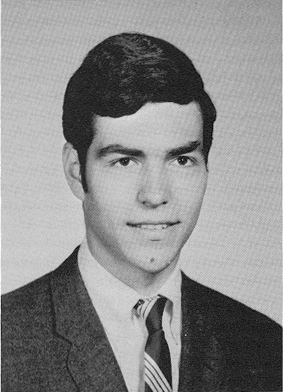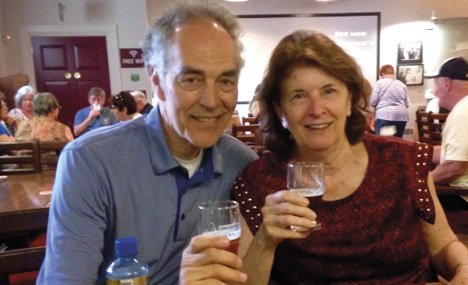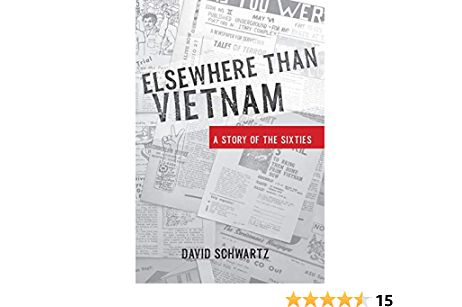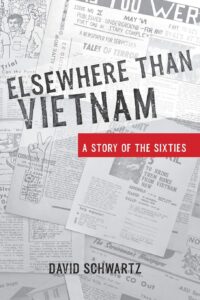A Classmate’s Vietnam Era – and Ours
In June, 1971, as the Vietnam War raged and some of us Yale ‘69’ers were still deferring or finalizing our draft status, the Armed Forces Journal, a non-government magazine read mainly by retired and serving officers, published the following assessment by Col. Robert D. Heinl, Jr.:
“The morale, discipline, and battle-worthiness of the U.S. armed forces are… lower than at any time in this century…. [O]ur army that now remains in Vietnam is in a state approaching collapse, with individual units avoiding or having refused combat, murdering their officers and non-commissioned officers, drug ridden, and dispirited…. Elsewhere than Vietnam, the situation is nearly as serious.”
That assessment supplies the title as well as the frontispiece of Elsewhere Than Vietnam, a historical novel-cum-memoir by our classmate (and one of my Davenport roommates) David Schwartz. Dave has given us the gift of a fictionalized account of his experience as an Army language specialist and interrogator for military intelligence (which he really was, elsewhere than in Vietnam, but at the height of the war and of rising opposition to it, at home and abroad).
As both a novel and a memoir, Elsewhere takes us to places where Dave served and wandered, from the Army’s language school in California (where he learned Czech) to Munich (near where he interrogated defectors from you-know-where) and even to an Israeli kibbutz. It’s all portrayed only through the life of a fictional protagonist, Steven Miller, but it weaves together so many of Dave’s own inextricably moral, political, and intimate responses to the cultural and official winds buffeting us at the time that it works as a memoir of the period, even when not always as an accurate record of Dave’s and his real friends’ experiences.
Opening with verbal snapshots of “coeducation week” at Yale in 1968 and ending with his discharge from the Army in 1972, Elsewhere revivifies — in spare, almost artless prose, modeled at least aspiringly on Hemingway’s – the moral and logistical tensions that gripped many of us as we tried to reconcile our training to “go with the program,” including a citizen’s duty to be drafted, and, on the other hand, our rising, justified disgust and outrage about the war.

- Dave in 1969
That such tensions intensified for many within the Army itself is depicted in Dave’s accounts of Miller’s excelling in military tests and disciplines even while fraternizing on the sly with antiwar Americans inside the military and out. At one point, Miller is invited by an officer who has reviewed his sterling record but is unaware of his off-base activities to infiltrate and spy on an antiwar coffee house and underground newspaper with which he’s already had friendly contacts. Read the book to find out how he responds to that “assignment.”
At another point, Miller’s work with fellow-interrogators – Germans who’d been Wehrmacht soldiers in World War II but were working with Americans against the Soviets during the Cold War — suggests that it wasn’t only American grunts who resisted their countries’ war machines. Although I don’t doubt that many Wehrmacht grunts were ordinary guys who did horrible things to civilians only because they were ordered to and were threatened with the worst if they didn’t, I do doubt, given fascism’s way of controlling and distorting “decent” people’s murderous impulses, that there was that much similarity between the World War II Wehrmacht and the near-mutinous U.S. Army that Col. Heinl portrayed during the Vietnam War. Dave and Steven Miller recognize both possibilities.
The novel plays a bit with the first names of some of us who’ve known its author in real life. Sometimes that feels strange: Did Dave’s (and Steven’s) roommate “Jim” (aka, me!) really whip out a magic marker and draw horns on LBJ’s televised head as Johnson was announcing that he wouldn’t seek or accept his party’s nomination in 1968? I honestly don’t recall, but Dave has Steven’s roommate Jim doing that in the novel. He mixes events that truly did happen with fictions that sometimes confound my own memory of what actually occurred.
A novel does that to “real” events, of course, often prefaced with disclaimers of any resemblance to real persons. But I don’t see any such disclaimers here, and in an historical novel like this, that could be a problem. Dave’s “Acknowledgment” section consists of footnotes to non-fiction accounts of events in Germany, Prague, and Israel that he can’t have witnessed himself, as he has Steven Miller do in the novel.
That may confuse only the few of us who know and love the author and have gotten to know him better thanks to Elsewhere, even if we wonder at times which of his Army experiences actually happened and which he has written up for Miller by using the cited sources. But, again, that’s a problem for only a few of us, and since I’m writing this to all of our classmates, I can’t resist a closing reference to Dave’s fictionalizing his induction into the Army.

- David and Maryellen, from David’s 50th reunion essay.
In the novel, Steven Miller has a long goodbye with his girlfriend (and his future wife, Maryellen), on the New Haven Green, as Dave did in real life before walking past antiwar protesters to the Army’s recruiting office and induction center, next to the New Haven bus station. A few months earlier, Dave had taken an equally real train trip from New Haven to Springfield, MA, where he was transferred to Westover Air Force Base for his physical examination. After his roommates — Dan Tucker, John Willingham and I — parted with him on that occasion as he set out for the train station, the other three of us hopped right into John’s car and raced up I-91 to Springfield, arriving before the train did and surprising Dave with a second goodbye, not knowing just when we’d be seeing him again.
That little trick that we played isn’t in the novel, but it really happened, and it’s in my heart, along with the moral and logistical tensions that Dave lived with and portrays so compellingly in a book that starts simply and grows on you until it doesn’t let you go.
Elsewhere Than Vietnam, Sticky Earth Books 2019. Available also from Amazon and Dave Schwartz at dschwart26@comcast.net



Nice review, Jim. As always. I appreciate your contributions to the class in submissions such as this. You brought back feelings of that time for me with your account of the double good-bye in New Haven. Please keep up the good writing.